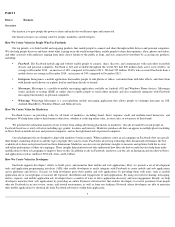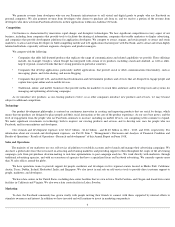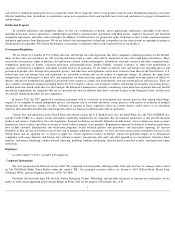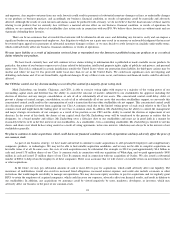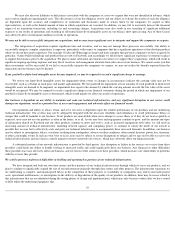Facebook 2014 Annual Report Download - page 14
Download and view the complete annual report
Please find page 14 of the 2014 Facebook annual report below. You can navigate through the pages in the report by either clicking on the pages listed below, or by using the keyword search tool below to find specific information within the annual report.
The occurrence of any of these or other factors could result in a reduction in demand for our ads, which may reduce the prices we receive for our
ads, or cause marketers to stop advertising with us altogether, either of which would negatively affect our revenue and financial results.
We generate a significant portion of our revenue from mobile advertising. Mobile advertising is evolving and growth in the use of Facebook through
our mobile products as a substitute for use on personal computers may negatively affect our revenue and financial results.
Facebook had 1.19 billion
mobile monthly active users (MAUs) in December 2014. We anticipate that growth in mobile users will continue to be
the driver of our growth for the foreseeable future and that usage through personal computers will continue to decline worldwide. We generate a
significant portion of our revenue from mobile advertising, which comprised approximately 69%
of our overall advertising revenue in the fourth quarter
of 2014. While our mobile advertising revenue continues to grow, the mobile advertising market remains an evolving market. If users continue to access
Facebook mobile products as a substitute for access through personal computers, and if we are unable to continue to grow mobile revenue or unable to
continue to successfully monetize mobile users, or if we incur excessive expenses in these efforts, our financial performance and ability to grow revenue
would be negatively affected.
Our user growth, engagement, and monetization on mobile devices depend upon effective operation with mobile operating systems, networks, and
standards that we do not control.
There is no guarantee that popular mobile devices will continue to feature Facebook or our other products, or that mobile device users will
continue to use our products rather than competing products. We are dependent on the interoperability of Facebook and our other products with popular
mobile operating systems, networks, and standards that we do not control, such as the Android and iOS operating systems, and any changes in such
systems, our relationships with mobile operating system partners, handset manufacturers, or mobile carriers, or in their terms of service or policies that
degrade our products' functionality, reduce or eliminate our ability to distribute our products, give preferential treatment to competitive products, limit
our ability to deliver, target, or measure the effectiveness of ads, or impose fees or other charges related to our delivery of ads could adversely affect
Facebook usage and monetization on mobile devices. Additionally, in order to deliver high quality mobile products, it is important that our products
work well with a range of mobile technologies, systems, networks, and standards that we do not control, and that we have good relationships with
handset manufacturers and mobile carriers. We may not be successful in maintaining or developing relationships with key participants in the mobile
industry or in developing products that operate effectively with these technologies, systems, networks, or standards. In the event that it is more difficult
for our users to access and use Facebook or our other products on their mobile devices, or if our users choose not to access or use Facebook or our other
products on their mobile devices or use mobile products that do not offer access to Facebook or our other products, our user growth and user
engagement could be harmed. From time to time, we may also take actions regarding the distribution of our products or the operation of our business
based on what we believe to be in our long-
term best interests. Such actions may adversely affect our relationships with the operators of mobile
operating systems, handset manufacturers, mobile carriers, or other business partners, and there is no assurance that these actions will result in the
anticipated long-
term benefits. In the event that our relationships with such third parties deteriorate, our user growth, engagement, and monetization
could be adversely affected and our business could be harmed.
Our business is highly competitive. Competition presents an ongoing threat to the success of our business.
We face significant competition in every aspect of our business, including from companies that provide tools to facilitate the sharing of
information, companies that enable marketers to display advertising and companies that provide development platforms for applications developers. We
compete with companies that offer full-
featured products that replicate the range of communications and related capabilities we provide. These offerings
include, for example, Google+, which Google has integrated with certain of its products, including search and Android, as well as other, largely
regional, social networks that have strong positions in particular countries. We also compete with companies that develop applications, particularly
mobile applications, that provide social or other communications functionality, such as messaging, photo- and video-sharing, and micro-
blogging, and
companies that provide web- and mobile-
based information and entertainment products and services that are designed to engage users and capture time
spent online and on mobile devices. In addition, we face competition from traditional, online, and mobile businesses that provide media for marketers to
reach their audiences and/or develop tools and systems for managing and optimizing advertising campaigns.
Some of our current and potential competitors may have significantly greater resources or better competitive positions in certain product
segments, geographic regions or user demographics than we do. These factors may allow our competitors to respond more effectively than us to new or
emerging technologies and changes in market conditions. We believe that some of our users, particularly our younger users, are aware of and actively
engaging with other products and services similar to, or as a substitute for, Facebook
11
•
the impact of new technologies that could block or obscure the display of our ads; and
•
the impact of macroeconomic conditions or conditions in the advertising industry, in general.






